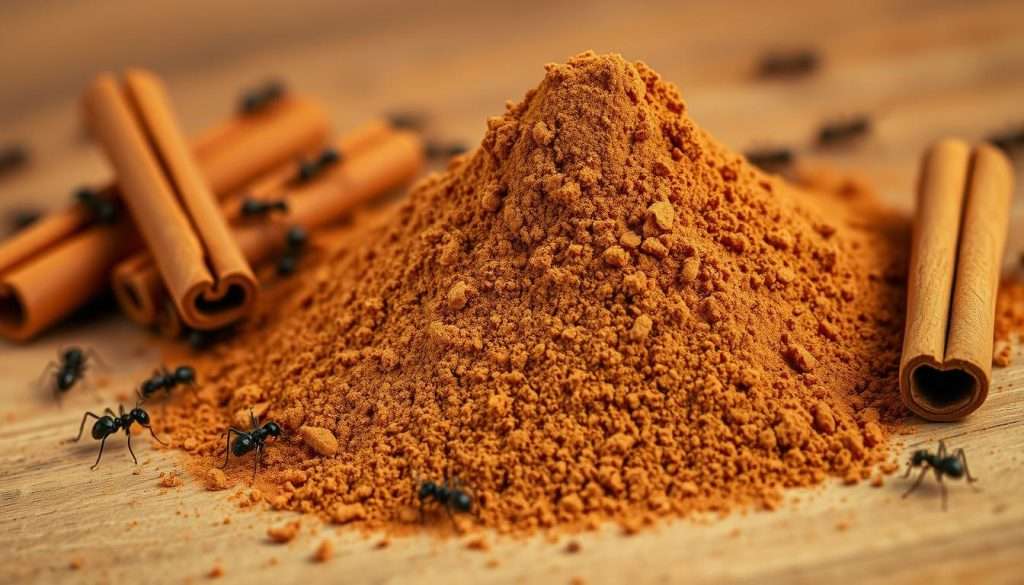Are you tired of fighting ants in your home? You’re not alone! Knowing what smell ants hate is key for anyone wanting to keep ants away naturally. This guide will teach you how to use smells ants don’t like to keep your home pest-free. You’ll learn to use natural solutions without harsh chemicals.
Ants are drawn to your kitchen and pantry because of food and shelter. But, you can keep them away with simple changes and common items. We’ll explore smells that keep ants away and make your home more comfortable. No more harsh chemicals!
Key Takeaways
- Understanding ant attraction is key to prevention.
- Natural ant repellents can be easily made with household items.
- Several scents, including vinegar, peppermint oil, and cinnamon, effectively repel ants.
- Utilizing essential oils can enhance the effectiveness of your repellents.
- Implementing these solutions can promote a safer home environment.
Introduction: Understanding Ants
Ants are fascinating creatures that play essential roles in our ecosystems. They have complex social structures and ways of communicating. As pests, they often invade homes in search of food and moisture.
They are attracted to sweet or greasy items. This is why they often find their way to kitchens and pantries.
By knowing what drives these tiny invaders, you can take steps to keep them away. Simple changes in your home can help a lot. Using natural repellents can disrupt their scent trails and keep them out.
Scents like vinegar, peppermint oil, and cinnamon can make your home less welcoming. This is a chemical-free way to manage ants.
Learning more about ants and what they like can help you make your home less appealing to them. With the right knowledge and tools, you can effectively protect your home from ants.
The Basics of Ant Attraction
Knowing why ants are attracted to certain things helps prevent them. Ants look for food sources in homes. Crumbs or spills on counters are perfect for them. Keeping your kitchen clean is key.
Ants also like damp places. Fixing small cracks and using a dehumidifier can help. Watching for entry points makes your home less inviting to ants.
Also, store pet food and pantry items in sealed containers. This reduces food sources for ants. Simple steps like these help a lot in pest prevention.
What Smell Do Ants Hate
Knowing what smell ants hate can help keep them out of your home. Many scents repel ants, offering safer, natural options. Household items can keep ants away and have other benefits too.

Common Scents That Repel Ants
- Peppermint oil: This scent disrupts ants’ sense of smell, acting as a powerful deterrent.
- Vinegar: Its strong smell makes vinegar a potent repellent when mixed with equal parts water.
- Citrus fruits: Scents from orange and lemon peels are particularly repulsive to ants.
- Cayenne pepper: Mixing cayenne with water creates an effective spray that ants dislike.
- Thyme: This herb interferes with ants’ pheromone trails, confusing their navigation.
- Lavender: The soothing scent of lavender doubles as a natural deterrent.
- Black pepper: A mixture of black pepper and water can repel ants effectively.
Benefits of Using Natural Repellents
Choosing natural repellents is good for your health and the environment. They avoid harsh chemicals, making them safe for kids and pets. Peppermint and vinegar are effective and affordable.
Many people like these solutions because they are easy to use. They are also less invasive, which is great for small ant problems.
Vinegar: A Dual-Purpose Ant Repellent
Dealing with ants at home can be tough. But vinegar is a great solution. It keeps ants away and cleans surfaces too. Knowing how to use vinegar is key to controlling ants.
How to Use Vinegar Effectively
To make a natural ant repellent with vinegar, just follow these steps:
- Mix equal parts of white vinegar and water in a spray bottle.
- Spray the mixture on surfaces where you’ve noticed ant activity.
- Soak cotton balls in vinegar and place them near ant nests for added effectiveness.
- Regularly reapply the solution to keep ants at bay.
This method works because vinegar messes with ants’ pheromone trails. This makes it hard for them to find food.
The Science Behind Vinegar’s Effect on Ants
Ants have been around for over 140 million years. They use pheromones to talk to each other. Vinegar’s strong smell messes with this communication.
Ants get lost because of vinegar’s smell. They can’t follow their usual paths. This makes them look for food elsewhere, without harming them.
Using vinegar as a repellent makes your home cleaner. It also keeps ants away. Regular use and proper application can help keep your home ant-free.
Peppermint Oil: A Minty Fresh Ant Deterrent
Peppermint oil is a great way to keep ants away. It smells strong and messes with ants’ communication. This makes it hard for them to follow trails.
Using peppermint oil in your home keeps ants out. Plus, it makes your place smell fresh.
Applying Peppermint Oil for Maximum Effectiveness
Here are some tips to use peppermint oil well:
- Mix 10-15 drops of peppermint oil with two cups of water in a spray bottle. Spray areas where you’ve noticed ant activity.
- Add approximately 5-10 drops of peppermint oil to your regular cleaning solution for added protection against ants.
- Monitor the effectiveness of peppermint oil-soaked cotton balls placed near entry points to effectively deter their presence.
- Apply peppermint oil directly to ant nests to prompt a mass exodus.
Peppermint oil keeps ants away from surfaces. But, it might not get into ant nests deep down. Its smell can also fade, making it less effective over time. You’ll need to use it again to keep ants away.
In gardens, mix 8 drops of peppermint essential oil per 600 ml of water. This makes a good repellent for outdoor areas. Mixing peppermint oil with other oils like citronella or garlic can make your pest control even better.
Peppermint oil is a quick and nice way to fight ants. But, it works best when you use it with other natural methods. This way, you get the best results.
Cinnamon: A Spicy Ant Deterrent
Cinnamon is not just a tasty spice; it also keeps ants away. Its strong smell helps keep these pests out. It’s a favorite among homeowners. We’ll look at how to use cinnamon and safety tips.
Different Forms of Cinnamon That Work
There are many ways to use cinnamon to keep ants away. Each type has its own benefits:
- Ground Cinnamon: This is the most common type. It’s easy to sprinkle where ants are seen.
- Cinnamon Sticks: Sticks can be placed in entry points or cabinets. They last longer without making a mess.
- Cinnamon Leaf Essential Oil: This oil is strong. Mix it with water and spray it where ants are a problem.
The main ingredient in cinnamon that bothers ants is cinnamaldehyde. It messes with their trails, making it hard for them to find their way.
Safety Considerations When Using Cinnamon
While cinnamon is safe, it’s important to be careful. Too much cinnamon can be bad, especially for pets. Here are some safety tips:
- Keep cinnamon away from pets.
- Don’t use too much to avoid strong smells.
- Watch out for other pests if you use too much cinnamon.

Knowing how to use cinnamon right can help keep ants away. It’s a safe and natural way to fight ants. Using cinnamon is a smart choice for your home.
Coffee Grounds: An Ant’s Worst Nightmare
Coffee grounds are a great tool against ants. They smell bad to ants, making them a good natural pest repellent. Using coffee grounds also makes your garden soil better. Here’s how you can use this household item to your advantage.
How to Use Coffee Grounds as an Ant Repellent
Using coffee grounds is easy at home and in your garden. Just follow these steps:
- Sprinkle used coffee grounds where ants are seen. Focus on where they get in.
- Create a barrier of coffee grounds around your garden. This keeps ants out of your plants.
- Mix coffee grounds into your compost. It makes the soil better and keeps pests away.
- Burn coffee grounds to make a strong smell. This keeps flying pests like mosquitoes and wasps away.
Studies show that burnt coffee grounds are great against ants and cockroaches. Coffee’s caffeine and diterpenes kill insects. A little coffee grounds can really bother an ant colony.
This easy trick keeps ants away and makes your garden better. You’ll have a pest-free home and happy plants.
Chalk and Baby Powder: Disrupting Ant Scent Trails
Chalk and baby powder can stop ants from coming into your home. Ants use scents to find food and move around. By using these items, you block their way, making it tough for them to find their path.
Chalk and baby powder mess with ants’ scent signals. This makes it hard for them to find food and get in. This leads to:
- Less ant activity, with a success rate of 75% to 85%.
- Ants get lost because they can’t follow their usual trails.
- A better way to fight ants without using strong chemicals.
Here are some tips to use chalk and baby powder well:
- Find where ants usually come in, like cracks and where food spills.
- Draw a line with chalk at these spots to block them.
- Spread baby powder on the same paths to make a thick layer.
- Keep these barriers up, especially after cleaning or rain.
Using these methods keeps ants away from your home. Chalk and baby powder are great at keeping ants out. But, also check for food and keep your place clean to fight ants better.
Conclusion
Understanding ant behavior is key to stopping ant invasions. Ants use their sense of smell to find their way and talk to each other. This makes scents like peppermint oil, citrus, and vinegar great for keeping ants away.
Try out different natural repellents to see what works best for you. Peppermint oil and vinegar can make your home unappealing to ants. Keeping your home clean also helps these methods work better.
Using natural ant repellents is a safe and smart way to control pests. With a few easy steps and the right ingredients, you can keep ants out of your home.
